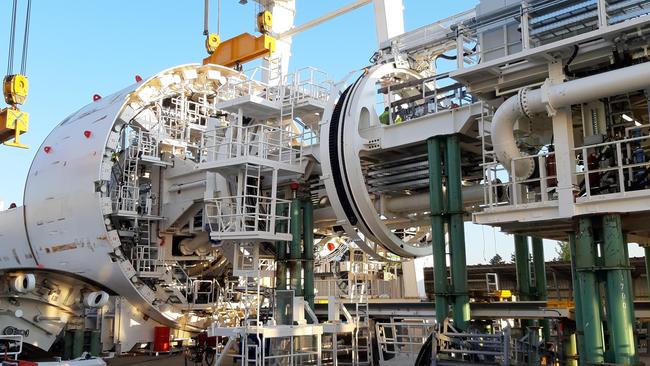Tony Shepherd quits Snowy Hydro board as troubles mount
High-profile company director Tony Shepherd has quit the board of Snowy Hydro in another blow to the government-owned company.
Business
Don't miss out on the headlines from Business. Followed categories will be added to My News.
High-profile company director Tony Shepherd has quit the board of Snowy Hydro in another blow to the government-owned company as credit agency S&P Global Ratings warned cost hikes on its major projects could help push up energy prices.
Snowy Hydro confirmed on Monday that Mr Shepherd finished up as a director of the company on May 31.
He also quit as the chairman of Venues NSW in February as he looks to slim down his business commitments.
Mr Shepherd was also the chairman of the Snowy board committee overseeing progress of the troubled Snowy 2.0 expansion, and his departure comes only weeks after the resignation of project director Kieran Cusack, and as the company puts together a new cost and schedule on the project for the federal government.
Mr Shepherd was appointed to the Snowy board in late 2020 for a three-year term.
His departure comes as S&P Global Ratings warned on Monday that blowouts on Snowy Hydro’s major projects could help push up energy prices as the government-owned company comes under “credit stress” over its bank debts.
S&P cut Snowy’s stand-alone credit rating, but lifted the company’s overall credit outlook from negative to stable on the assumption that any cost blowouts flowing from the Snowy 2.0 pumped-hydro scheme would be covered by equity injections from the government, rather than the company’s own earnings.
But the ratings agency warned the knock-on impact of the delays – now tipped to fully enter service in 2029, two years later than first expected – could put energy prices across the National Electricity Market under pressure.
Snowy is the biggest supplier of firming power on the east coast, with its hydro power and gas peakers coming into the market when demand rises or other generators fail and spot prices rise – helping stabilise both energy supply and pricing.

But with Snowy 2.0 facing significant delays, along with a new gas peaking plant at Kurri-Kurri, S&P warned delayed revenue from the projects – and an additional $180m to $200m in costs at Kurri-Kurri, which Snowy is likely to have to cover from its own earnings – could put pressure on its ability to service its bank debts.
Snowy owed $2.7bn in bank debt as at June 30, 2022, according to its last annual report, up from $2.2bn a year earlier.
S&P said it expected Snowy to book strong margins this financial year, upgrading its EBITDA expectations from $240m-$300m to a range between $420m and $440m, followed by an improvement to $630m-$800m the following year.
“Capacity pricing linked to wholesale electricity prices and the commissioning of (Kurri-Kurri) will shape Snowy Hydro’s earnings profile in subsequent fiscal years. This is particularly given the impact of the poor reliability of coal generation, variable renewable output, and recent closure of the Liddell coal-fired plant on the industry,” S&P said on Monday.
But delays in commissioning Kurri-Kurri, along with the potential for further delays at Snowy 2.0, could hamper the company’s cash flows as it services debt at the same time as spending big on growth projects.
“We believe a credit stress on Snowy Hydro could have cascading effects on the energy market. The effects could take the form of higher energy costs and pose a risk to system stability, given the company is the largest capacity provider in the energy market,” S&P said.
Snowy is expected to deliver an updated cost and schedule for the pumped-hydro expansion in July, and is currently renegotiating the fixed-price contract with Italy’s Webuild – with an outcome of those negotiations due shortly.
Key issues in those negotiations will be the projected movement from a fixed-price to a cost-plus contract, and what margin Webuild is allowed to build in to its invoicing, along with whether incentives are offered for quick completion of the massive job.
The two companies are also believed to be trying to thrash out how much Snowy Hydro will cover of the $2.2bn cost overrun claims already submitted by Webuild.
The Snowy project has been dogged by a series of project issues including the collapse of one of its contractors, Clough, delays through Covid-19 and, more recently, a major tunnel boring machine getting stuck in the Snowy Mountains.
And Snowy Hydro could still be hit with a further cost blowout at its Snowy 2.0 expansion, S & P said on Monday.
“Further cost increases and delays at Snowy 2.0 and Hunter Power Plant cannot be ruled out, due to the complex nature of the project,” S & P said.
“We expect Snowy Hydro to continue paying its engineering, procurement, and construction contractor, Future Generation Joint Venture, while clarity emerges on cost overrun claims by Future Generation, any potential contract renegotiations, and revised estimates for the project cost of Snowy 2.0 over the next one to two years.”
S&P revised its long-term “issuer and issue” BBB+ rating outlook on Snowy Hydro to stable from negative, based on its view of ongoing federal government support to fund the two projects.
But S&P also dropped its stand-alone credit rating for Snowy to BB+, from BB.
More Coverage
Originally published as Tony Shepherd quits Snowy Hydro board as troubles mount





